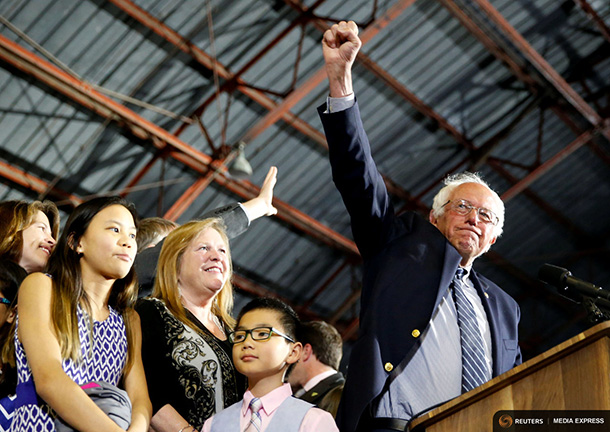Senator Bernie Sanders claimed his campaign would build a political revolution. But what now, since he's all but out of the presidential race?
Last weekend in Chicago, 3,000 Sanders supporters gathered for the People's Summit, a time to lick the wounds from a bruising campaign and plan ways to make the political revolution last beyond the Sanders campaign.
"People are willing to do something big to win something big," Becky Bond, senior advisor to the Sanders campaign, said during one of the plenary sessions. "When we asked people to do something big, not only did they do it, they came back and said, what else can I do?"
Over the course of three days, plans of action emerged out of anger, playfulness, regional gatherings and national strategizing.
These plans are not about settling for small things. Instead of an agenda that is palatable to establishment insiders, Summit participants want big change to be part of the political revolution: promoting Medicare for all, taking on the climate crisis and ending the war in Syria. And there was a widespread call for addressing the nation's deep racial and ethnic divides.
Addressing the urgency of these and other issues, Bond said, "We can't pick one thing to do now; we have to do it all together."
The most powerful questions of our time are: "Who is an American? What do we owe to one another?" said Heather McGhee, president of Demos.
The focus of the political revolution, though, is confronting the economic hardships experienced by millions of Americans.
"We need to address neoliberalism, which is the real source of economic pain," said Bond.
Neoliberalism, a term that is only now becoming widespread in progressive circles, refers to a set of policies that advances the interests of transnational corporations over small and local businesses, and over workers and communities. These include trade agreements like the TPP; the privatization of public resources like water, schools, social services and transportation; and cuts in environmental and safety regulations. Tax breaks for the wealthy and corporations force governments into austerity spending, starving local and national budgets.
The clincher
While many Sanders supporters plan to attend next month's Democratic National Convention as delegates, or to protest outside, plans for political revolution extend far beyond Philadelphia. The Berniecrats Network lists 420 candidates for political office who identify with the Sanders agenda. While some candidates were knocked out in recent primaries, others won their primary races. At the Summit, hundreds of participants who responded to an online poll said they would contribute 100 hours or more each to support such races.
And here's the clincher that really might make this a revolution rather than a failed presidential campaign:
When Obama won the presidency in 2008, the contact lists, the local connections -- all the infrastructure that resulted from mobilizing millions of voters -- was turned over to the Democratic National Committee. This infrastructure became a top-down conduit for messages from Washington, D.C., but it was unavailable to Obama supporters who had built the movement and who wanted to continue pressing for change.
That won't happen this time.
The Sanders campaign built a social media network that reached 130 million people, many of whom volunteered time and donated money. This campaign infrastructure belongs in large part to teams of volunteers, some based in cities, some in affinity groups, according to Bond.
"A lot of the time and money invested by the Bernie Sanders campaign went to grow an independent force that will align with big things that they are asked to do, and if they're not asked to do big things, they are going to come up with the big thing," said Bond.
So local candidates and teams of volunteers go forward armed with a powerful agenda and effective technology, with offers of help from thousands, perhaps millions, of people who signed on to the Sanders campaign. With this as a starting point, the political revolution is poised to become a powerful force, everywhere. ![]()
Read more: Politics















Tyee Commenting Guidelines
Comments that violate guidelines risk being deleted, and violations may result in a temporary or permanent user ban. Maintain the spirit of good conversation to stay in the discussion.
*Please note The Tyee is not a forum for spreading misinformation about COVID-19, denying its existence or minimizing its risk to public health.
Do:
Do not: